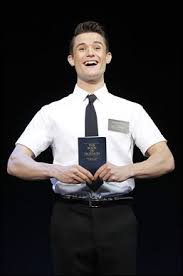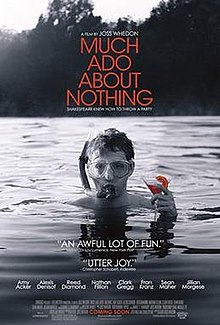25th July 2013, The Book of
Mormon at the Kennedy Center
 |
| Mark Evans as Elder Price |
I had a few complaints about The Book of Mormon, but these were
essentially ethical (see below). Of the key components needed for a good musical – captivating songs, delightful dance routines, a story that keeps you
hooked, characters you care about – The Book
of Mormon is handsomely kitted out. The songs are not quite up there with the best
efforts of Rice and Webber, but then what is nowadays? The song ‘Hello’ is incredibly
catchy and gets the show off to a flier, and ‘You and Me (but mostly me)’, a
duet between the talented, hardworking Elder Price (Mark Evans) and the lazy,
laid back lying Elder Cunningham (Christopher John O’Neill) is also solid. A
couple of the better ones were simply comedy copies of other musical hits; for
example The Lion King’s ‘Hakuna Matata’ became ‘Hasa
Diga Eebowai’ (‘Does it mean no worries?’ ‘No, it means F#!k You, God’),
and Annie’s ‘Tomorrow’ morphed into ‘Orlando’ (one of the Mormon
missionaries vision for the afterlife involves becoming the god of a new planet
based on Disney World). ‘Joseph Smith American Moses’, the African villagers’ version
of Mormonism as explained to them by Elder Cunningham, is a hilariously messed
up mélange of Mormonism and sci-fi. And Evans is so perfectly cast as the good
but soon to be disillusioned, all-American Mitt Romney lookalike that I was
surprised to learn later that he’s a fellow Englishman.
But then we come to the shortcomings. I don’t
especially like jokes about raping babies or the number of Africans with AIDs,
but I accept that my delicate moral qualms are out of sync with our wider
culture. If there were any absolute moral standards to cling to such personal
discomfort might begin to engender thoughts about Western spiritual decline.
But, of course, moral standards are a repressive pre-modern myth. And I’m sure
the creators would be disappointed if there weren’t still a few old fuddy-duddies
like me around to offend. ‘Pushing boundaries’ has become the key criterion for
judging art. Inevitably this means ‘transgressing’ the rules that art should be
beautiful and uplifting, and the only way to get a response is to produce
something ugly and offensive. So how do you shock the audience? You get
everybody chuckling by drawing attention to the incongruity of our images of
Africa from The Lion King and the
‘reality’ portrayed here of prevalent AIDs, men raping babies and the mutilation
of girls’ genitals. These issues do demand attention (though not necessarily
through the medium of musical theatre); but I was also struck by another distasteful,
but this time unintended, incongruity: here was an audience of predominantly
liberal, progressive types, many having paid $250 a ticket, guffawing at jokes
about disease ridden, mutilated Africans.
The overwhelming popular acceptance of The Book of Mormon does reveal something
interesting about the extent of hypocrisy surrounding the values of modern
progressive culture (because, of course, relativism is really only applied to
debunk traditional moral standards). One doesn’t need much imagination to know
that if any known conservative had depicted Africans with anything approaching
this level of idiocy and depravity, they would have been mercilessly castigated
as a racist reactionary. However, because The
Book of Mormon’s more obvious target is religion, a perfectly acceptable
progressive object of ridicule, the overt liberalism of anti-religiosity earns
them a pass on any potential question of racism. The treatment of Africans here
is an echo of the contrived controversy last year in America
But my main criticism of the musical goes
beyond nauseating baby-rape jokes, the hypocrisy of politically correct
progressivism and even the obvious conclusion that we’re living in the sort of
degenerate era usually followed by a dark age. No, the main weakness of the
musical is its lack of controversy in its key selling point. Is a satire on
religion really especially daring in 2013? Jesus
Christ Superstar took some liberties with the Bible and earned some
controversy, but that was back in 1967. Monty Python’s Life of Brian was even more evidently a satire on religion, and was
banned in a number of cinemas across the world. That was back in 1976, when
church attendance and respect for religion were much higher than today. And the
religion under attack was Christianity. A satirical musical on Islam would also
be daring… but the Mormons? Only a tiny percentage of Americans are Mormons and
they have few defenders outside their sect. Atheists and agnostics see it as a
joke religion already and even mainstream Christians find them suspect. And
unlike certain religions noted for their angry attitude towards perceived
insults, Mormons are nice too. There were no Mormon pickets outside the theatre,
and the programme actually contains friendly adverts from the Mormon Church
pointing out that ‘you’ve seen the play, now read the book!’ The current head
of the Mormon Church, Thomas S. Monson, may have once been voted ‘The MostPowerful Octogenarian in America,’ but he isn't in the fatwa-issuing habit, so the cast and creators probably don’t need to go into hiding just
yet.
There was plenty of emphasis in the musical
about Mormonism being the American
religion, created in America and having a uniquely American character. This
makes it fair game for attacks from leftist anti-religionists who would
normally avoid attacking non-western religions because their anti-religious
sentiment in those cases is cancelled out by their anti-western sentiment. We
don’t have to imagine how liberals react when non-western religions are
insulted because there is a good recent example to hand. In 2011 the American
ambassador to Libya and his security team were attacked and killed in an attack
originally (mistakenly) attributed to Muslim anger about an internet video
produced in America by an Egyptian Copt named Nakoula Basseley Nakoula. This
low quality film depicted Mohammed in a very bad light and provoked a good deal
of anti-American anger. President Obama was quick to label it a ‘crude and
disgusting video’ and he ‘made it clear that the United States government had
nothing to do with this video,’ whose ‘message must be rejected by all who
respect our common humanity.’ It was also ‘an insult not only to Muslims, but
to America as well.’ He went on to add that ‘the future must not belong to
those who slander the prophet of Islam.’ He did also point out that America believed
in freedom of speech and would not ban the video; however, then Secretary of
State Clinton told one of the victims’ parents that the administration would
‘get’ the perpetrators of the video. Despite the video itself breaking no
American laws, Nakoula was duly investigated and found to have violated his
parole for a former offence and imprisoned for a year. It is hard to escape the
conclusion that Nakoula was really locked up to appease Islamic anger. Now, picture
an alternate reality where a Republican president had made a similar speech
attacking the creators of The Book of
Mormon, where the Secretary of State had promised to ‘get’ its creators and
where they had been duly ‘got’ and locked away on trumped up charges. There
would be a liberal outcry. Islam cannot be attacked, Mormonism can.
There has
been no real controversy over The Book of
Mormon because they are a weak religion, unpopular with both Christians and atheists,
with no defenders. Satire should bring the powerful down to earth. It should be a tool of
the weak against the strong, but The Book
of Mormon does exactly the opposite. In essence, its creators are bullies,
and we, the tittering audience, are their supportive stooges. And this isn’t altered by the
fact that Mormonism was such an enticing target because of the apparent
wackiness of some of their beliefs (getting your own planet after death, the
gold tablet that nobody was allowed to see, the 2,000 year old Jewish civilization
in America that has vanished without a trace).
 Despite these scruples, I still enjoyed the
show. It ends on a happy, and even slightly pro-religious, note. It’s not an
endorsement of religion as the truth, but it does portray the Mormons as extremely
decent and blissful people (despite the occasional need to repress their un-Mormonic
urges), and it does portray religion as something socially useful in backward
places (and the Uganda of the musical is definitely a backward place).
Essentially, the show shows us that a ‘good’ religion is one which has no
regard for the truth but is instead tailored to solve the social problems of
the local area. It isn’t exactly an uplifting view of religion but, with the
catchy songs, a few great lines, and the joyous finale, it would be difficult
for even a curmudgeon like me to leave the theatre without a spring in his
step.
Despite these scruples, I still enjoyed the
show. It ends on a happy, and even slightly pro-religious, note. It’s not an
endorsement of religion as the truth, but it does portray the Mormons as extremely
decent and blissful people (despite the occasional need to repress their un-Mormonic
urges), and it does portray religion as something socially useful in backward
places (and the Uganda of the musical is definitely a backward place).
Essentially, the show shows us that a ‘good’ religion is one which has no
regard for the truth but is instead tailored to solve the social problems of
the local area. It isn’t exactly an uplifting view of religion but, with the
catchy songs, a few great lines, and the joyous finale, it would be difficult
for even a curmudgeon like me to leave the theatre without a spring in his
step.
Next week,a silent version of A Midsummer Night's Dream at the Synetic Theater




